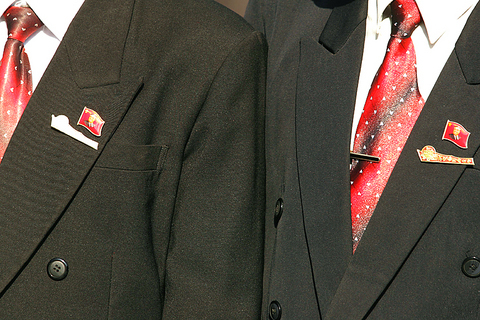The US is looking at new ways of forcing North Korea to give up its nuclear weapons but analysts said Tuesday it has little room for maneuver if the current six-party talks remain snagged.
Any move for international sanctions against Pyongyang, they said, would have to be done via the UN Security Council, but this had already been opposed by China and Russia and was expected to be rejected even by US allies Japan and South Korea.
North Korea meanwhile continues to say it will return to negotiations only if the conditions are right -- meaning the US has to sweeten its offer on the table.

PHOTO: AFP
But Washington has ruled out giving any new incentives upfront to Pyongyang in return for disarmament, apart from endorsing a multilateral security guarantee and energy aid by the Stalinist state's neighbors.
US Secretary of State Condoleezza Rice, who held meetings last week with Chinese, South Korean and Japanese leaders, has warned that North Korea faced "problems" if it failed to return to the six-party talks and that Washington was looking at "other options."
This was seen by analysts as a strong hint that Washington might resort to sanctions against the hardline communist state, a move that was flatly rejected by veto-wielding powers Moscow and Beijing three years ago.
Japan is also unlikely to back any US move on sanctions until at least another round of talks is held to break the nuclear impasse, Hideshi Takesada, from Japan's National Institute of Defense Studies, told a forum in Washington.
"If we want to have decisive sanctions, China should join and also ROK [South Korea] should join.
"But China will say `no' to discuss or argue the North Korean nuclear issue in the United Nations, China will say `no' to participate in the proliferation security initiative and China will say `no' to join in any economic sanctions with Japan and the United States," Takesada said.
He added that Rice could set the stage for the US to seek UN support for its proliferation security initiative (PSI) against North Korea.
China is not part of the US-led PSI, aimed primarily at checking trafficking of weapons of mass destruction.
Host to the six-party talks, China is a key ally of and top aid provider to cash-strapped North Korea. But it has not been using full leverage against the reclusive state, accused of nuclear proliferation and other illicit activities.
Meanwhile, Chinese officials say North Korea's premier has told them Pyongyang might be willing to return to nuclear talks, despite the North's threat to indefinitely boycott the dialogue and claims that it has expanded its atomic arsenal.
"If conditions are right in the future, North Korea is willing at any time to participate at the six-party talks," Premier Pak Pong-ju told his Chinese counterpart, Wen Jiabao (
The spokesman, Liu Jianchao (

A fire caused by a burst gas pipe yesterday spread to several homes and sent a fireball soaring into the sky outside Malaysia’s largest city, injuring more than 100 people. The towering inferno near a gas station in Putra Heights outside Kuala Lumpur was visible for kilometers and lasted for several hours. It happened during a public holiday as Muslims, who are the majority in Malaysia, celebrate the second day of Eid al-Fitr. National oil company Petronas said the fire started at one of its gas pipelines at 8:10am and the affected pipeline was later isolated. Disaster management officials said shutting the

US Vice President J.D. Vance on Friday accused Denmark of not having done enough to protect Greenland, when he visited the strategically placed and resource-rich Danish territory coveted by US President Donald Trump. Vance made his comment during a trip to the Pituffik Space Base in northwestern Greenland, a visit viewed by Copenhagen and Nuuk as a provocation. “Our message to Denmark is very simple: You have not done a good job by the people of Greenland,” Vance told a news conference. “You have under-invested in the people of Greenland, and you have under-invested in the security architecture of this

Japan unveiled a plan on Thursday to evacuate around 120,000 residents and tourists from its southern islets near Taiwan within six days in the event of an “emergency”. The plan was put together as “the security situation surrounding our nation grows severe” and with an “emergency” in mind, the government’s crisis management office said. Exactly what that emergency might be was left unspecified in the plan but it envisages the evacuation of around 120,000 people in five Japanese islets close to Taiwan. China claims Taiwan as part of its territory and has stepped up military pressure in recent years, including

UNREST: The authorities in Turkey arrested 13 Turkish journalists in five days, deported a BBC correspondent and on Thursday arrested a reporter from Sweden Waving flags and chanting slogans, many hundreds of thousands of anti-government demonstrators on Saturday rallied in Istanbul, Turkey, in defence of democracy after the arrest of Istanbul Mayor Ekrem Imamoglu which sparked Turkey’s worst street unrest in more than a decade. Under a cloudless blue sky, vast crowds gathered in Maltepe on the Asian side of Turkey’s biggest city on the eve of the Eid al-Fitr celebration which started yesterday, marking the end of Ramadan. Ozgur Ozel, chairman of the main opposition Republican People’s Party (CHP), which organized the rally, said there were 2.2 million people in the crowd, but